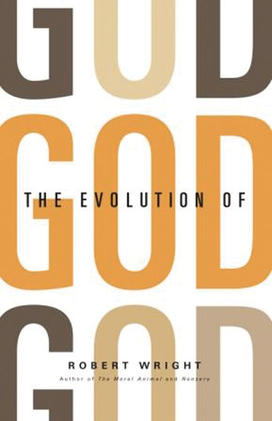The evolution of God
Journalist Robert Wright ’79 examines how people’s understanding of God has matured

Believers in the three major monotheistic faiths might find troubling ideas in Robert Wright ’79’s new book, The Evolution of God. For starters, he notes that ancient Israel was polytheistic until the Babylonian exile, during the 6th century B.C., many centuries after Moses is believed to have lived. Jesus probably did say “Love your neighbor,” Wright argues, but he meant love your Jewish neighbors, not all neighbors. As for Islam, Wright says that Muhammad’s utterances expressed in the Koran reflect not God’s will, but the prophet’s pragmatic, political calculations.
“I wouldn’t expect devout believers in any of the three Abrahamic faiths to be happy with my depiction of how their traditions developed, because it’s told from the point of view of someone who does not subscribe to their claims of special revelation,” says Wright, whose book, published in June by Little, Brown and Company, explores what the Scriptures reveal about the unfolding of the three religions and about people’s understanding of God.
The conceptions of God as expressed in the Hebrew Bible, The New Testament, and the Koran are driven by what Wright says are the political and economic situations of the writers of those texts, not by any divine revelation handed down from on high. When the Scripture writers perceived their fortunes to be intertwined with the fortunes of others — a win-win relationship — the God in the texts became more tolerant and benign. But if the writers perceived win-lose scenarios — that their people’s fortunes were inversely related to the fortunes of others — their God appeared more belligerent.
For example, based on Wright’s analysis, Jesus probably was a nationalistic Jew focused on the salvation of Israel only — and there are passages in the gospels that reflect Jesus’ enmity toward non-Israelites. It was the apostle Paul, not Jesus, who saw the advantage of preaching universal love that crosses national and ethnic boundaries — the better to spread the movement across the Roman empire. Jesus’ character and utterances in the Scriptures were made more compassionate long after he died, Wright argues.
The God of all three faiths, he writes, over time grows progressively more tolerant of other faiths and nations and less vengeful — albeit with some backsliding here and there. Why? Because as people’s social interactions expanded, they increasingly saw their fortunes as interrelated. God grew with them.
A journalist who specializes in evolutionary psychology and writes about a range of issues related to technology, religion, and foreign policy, Wright has taught philosophy at Princeton and religion at the University of Pennsylvania. He is a senior fellow at the New America Foundation and editor-in-chief of Bloggingheads.tv, a video Web site where journalists, scholars, and authors discuss current issues.
In his books, Wright has examined moral behavior from different angles. In The Moral Animal: Why We Are the Way We Are: The New Science of Evolutionary Psychology (1994), he argued that certain aspects of human behavior (such as love and sacrifice) are products of natural selection. In Nonzero: The Logic of Human Destiny (2000), he laid out his thinking that moral progress is based on the growing recognition of our interdependence on other people — what Wright refers to as “non-zero sumness.” He spent nearly 10 years researching and writing The Evolution of God, including a year as a visiting fellow at Princeton, where he used the time to get up to speed on the Hebrew Bible.
The moral progress that Wright sees at work in history and in religious texts, he argues, might be evidence of a “higher purpose” — what some people call the divine or God. By this, Wright means a kind of deism in which purpose in nature was imbued at the beginning and follows physical laws. Wright says he’s “almost a little more religious than the term agnostic implies. I do believe there is some sort of larger purpose at work. Although I’m not sure.”
Wright started out on this book with questions about the contemporary world: Can religion and science coexist? Can believers in Christianity, Judaism, and Islam get along today? To the first question, Wright points to a Jewish thinker born near the end of the first century B.C., Philo of Alexandria. Philo had an abstract notion of God as “logos” — a logic driving life and history and “moving human beings closer to wisdom and thus closer to God’s perspective,” says Wright. Many elements of Philo’s conception of God are “viable even in a scientific world,” he says.













3 Responses
Christopher L. Webber ’53
10 Years AgoLoving one's neighbors
Shouldn’t Robert Wright ’79 read the Bible before he writes about it (Alumni Scene, Sept. 23)? According to your writer, Wright says that Jesus “meant love your Jewish neighbors, not all neighbors.”
There are few subjects on which Jesus was clearer. A questioner asked him, “Who is my neighbor?” And Jesus responded with the story of the good Samaritan. Jews and Samaritans had no use for each other, but it was the Samaritan who came to the aid of the injured Jew. “Who is my neighbor?” Jesus asked the questioner. And when the questioner responded, “The one who showed mercy,” Jesus said, “Go and do likewise.” (Luke 10:29-37.) What part of that doesn’t Robert Wright understand?
William K. Mettler ’51
10 Years AgoWhat the Gospels say
Christopher Webber ’53 criticizes Robert Wright ’79 (letters, Nov. 4) for not understanding a passage from the Bible that proves Jesus preached love for everyone. If Mr. Webber believes, as some do, that God had a hand in writing the Bible through his revelations to mankind and therefore the Bible is not to be questioned, then there is little room for argument.
I would point out, however, that there are others of us who think that it is presumptuous for anyone to claim that they knew the mind of Jesus so well that they actually could quote him. As there were no stenographers following Jesus around, these so-called quotations are only the personal opinions and prejudices of various historians written years after Jesus’ death. Mr. Wright could be correct in his opinion that Jesus could have agreed with his fellow Jews in their distrust of their neighbors. On the other hand, it may be as Luke stated it: Jesus preached love of all mankind. However, if Mr. Wright is closer to the truth, it would not have been in the interest of those who later were promoting Jesus as the son of God to admit that Jesus was human, with likes and dislikes.
Who knows for sure? I certainly do not, but, in my opinion, neither does Mr. Webber.
Jamie Spencer ’66
10 Years AgoModifying the Gospel message
I have to disagree with Christopher Webber ’53, who rather contemptuously rejects Robert Wright ’79’s definition of what Jesus meant by neighbors (letters, Nov. 4). Wright says he meant only Jews. Webber says no way: He meant all of us. Well, before he starts citing the various Gospels as though they were authentic newspaper accounts of the man Jesus, Mr. Webber should do some outside reading himself. He should read Christian scholars like professors Marcus Borg or Bart Ehrman or Karen Armstrong. Try Bishop Jack Spong or Father Dominic Crossan. When he does, he’ll discover that the Jesus of the gospels is a post-hoc creation by men who never knew him. They were writers from a young, late-first-century movement trying to reach out to a non-Jewish audience. And in the process they inevitably modified Christ’s message.
Wright has it right: It was to his fellow Jews that the actual Jesus (a deeply devout Jew and zealous nationalist) was aiming his message. Naturally, we would all prefer Luke’s more ecumenical version. But his words are not reliably the words Christ spoke. Nor do they reflect the tribal ethics Christ proposed.